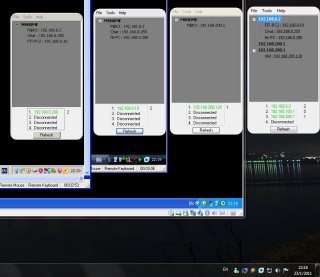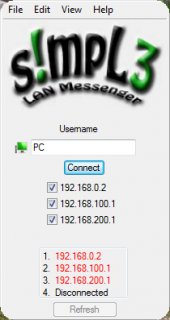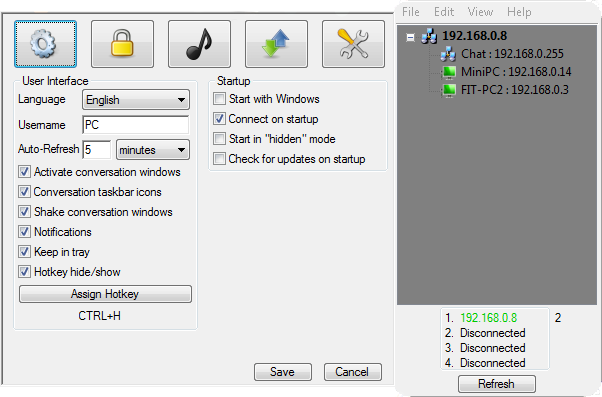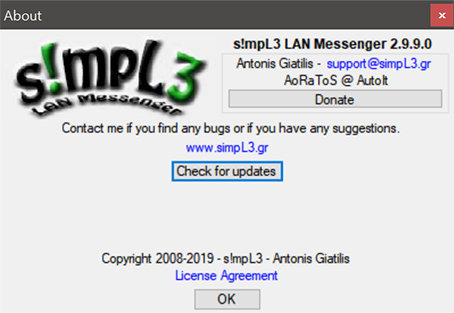Search the Community
Showing results for tags 'lan'.
-
I needed a function to ping many computers, and get the results of the pings in an array so to manage it easily in a script. Searching in the forum I found some interesting sw with a nice graphical interface, but not a generic function that simply return an array. a very powerful pinger I found is >nPing by Manadar, but it is designed as a command line tool, so I decided to use the entire engine of nPing adapting it a bit, so that it can be used as an udf. This code is a first attempt (beta) and it can be used to: Ping all computers (IP addresses) belonging to the (local) LAN just call the _nPing() without any parameter Ping a predefined list of IP just pass the list of host (IP or hastnames) to the function in an 1D zero based array or in a 2D array indicating the column containing the addresses Ping all computers (IP addresses) of a remote LAN just pass an IP of that lan and his subnet mask Ping range of computers (IP addresses) just pass a string rappresenting the range of IP to ping (as accepted by the nPing program by Manadar), for example: 192.168.0.0-1 will ping these addresses: 192.168.0.0 and 192.168.0.1 192.168.20.* will ping everything in the range from 192.168.20.1 to 192.168.20.255 192.168.0-1.1-254 will ping everything in the range from 192.168.0.1 to 192.168.1.254 I have not done extensive testing on it, so I would be grateful if someone that tries it, can report any error thanks EDIT: After some testing, I have seen that sometime some IP are reported as dead, while are alive instead. This occurs when a device is not so fast to answer to the ping, and so it's marked as dead while instead is only too slow to answer to the ping. I came to the conclusion that for a more accurate result about the not responding devices, is better to use a $timeout parameter of 4000 ms as default value in the _MSPing() function (the same default timeout value as in the standard ping command) So I have "calibrated" the multiping.au3 by modifying the line 349 and incrementing the value of the $Timeout variable from 100 ms to 4000 ms. This should be a better choice for a general purpose utilization that gives more stable and accurate results about the not responding devices. This should not slow down the overall performances, but will only give some more time to respond to the slower devices. MultiPing.au3 #include <iNet.au3> ; #INDEX# ======================================================================================================================= ; Title .........: _nPing ; AutoIt Version : ; Language ......: English ; Description ...: Function to perform multi Ping. ; Author(s) .....: core engine is Manadar's "nping" retrieved at the following post ; http://www.autoitscript.com/forum/topic/108060-nping-console-network-pinger-network-sweeper-network-scanner ; adapted to this UDF by PincoPanco ; =============================================================================================================================== ; #CURRENT# ===================================================================================================================== ; _nPing multi IP pinger ; =============================================================================================================================== ; #INTERNAL_USE ================================================================================================================= ; _LanParameters given IP and mask generate [and display] various lan parameters ; _CIDR_To_Mask transform a CIDR number (1 - 32) to the corresponding 4 digit mask ; _Mask_To_CIDR transform a 4 digit mask to the corresponding CIDR number (1 - 32) ; _GetSubnetMask given the local IP returns the related subnet mask (thanks to dragan) ; _Convert_To_Binary from decimal to binary ; _Bin_To_Dec from binary to decimal ; _FileReadToArray_mod read a file of IP in a 1D array, if is a csv and a separator is passed a 2D array is returned ; _GetIpAddressList Generate the IP list to Ping ; _Make_Range Given an IP and his mask, this function return the full LAN "range" for _nPing ; _GetLanParameters calculate all IP/subnet related parameters ; _isIPaddr check if passed IP is a plausible IP ; _isSNmask check if passed mask is a plausible mask ; _Progress shows a progress bar for the current scan ; =============================================================================================================================== ; #FUNCTION# ==================================================================================================================== ; Name...........: _nPing ; Description ...: returns an array containing: clients responding to ping or clients not responding or both. See $ReturnFlag ; Syntax.........: _nPing([[$IP]|[$IPArray]|[$IPrange]],[[$NetMask]|[$column]], [$ReturnFlag], [$Resolve], [$MyFunction]) ; Parameters ....: [[$IP]|[$IPArray]|[$IPrange]] - An IP address or an 1D or 2D array (0 based) or an IPrange(*) ; $NetMask - An 4 digit Net Mask or a CIDR notation value (numbers of bit from 1 to 32) ; if previous parameter is an 2D array then this parameter contains the ; nr. of the column that contains the addresses to be pinged ; $ReturnFlag - 0|1|2, what to return: 0=all cliensts; 1=responding clients; 2= not responding clients(**) ; $Resolve - O or 1, if IP lookup name resolution must be performed; 1 = yes, 0 = no ; $MyFunction - an User Defined Function to be called each time a PING complete (default is progress bar) ; the called function receives 1 parameter that is an array containing the following 6 parameters: ; [0] nr. of total addresses under process ; [1] nr. of ping already finished ; [2] IP just processed ; [3] resolved Host name or -1 if IP is down ; [4] roundtrip of this ping or -1 if IP is down ; [5] Index of this IP within the caller's passed array ; by default is called the _Progress() function that will display the progress bar ; Return values .: Success - an 2D array containing: ; first row ($array[0][x]) contains: [0][0]= nr. of returned host; [0][1]= total roundtrip ; other rows: [n][0]=Address; [n][1]=lookup name; [n][2]=roundtrip; [n][3]=index in the passed array*** ; Failure - -1, sets @error ; |1 - too many IP, max 16777216 ($MAX_HOSTS) ; |2 - wrong array dimensions or wrong column number ; |3 - wrong IP ; |4 - wrong subnet mask ; |5 - bad "range" or wrong IP error ; |6 - Windows Sockets Error ; |7 - (not used) ; |8 - DLL call error (reading local subnet mask) ; ; (*) IPrange is a string as below ; "192.168.0.0-1" will ping these addresses: 192.168.0.0 and 192.168.0.1 ; "192.168.20.*" will ping everything in the range from 192.168.20.1 to 192.168.20.255 ; "192.168.0-1.1-254" will ping everything in the range from 192.168.0.1 to 192.168.1.254 ; ; (**) returnead 2D array has the following 4 columns: ; first row contains: [0][0]= nr. of returned host; [0][1]= total roundtrip ; following rows contains fields as below ; +-------------------------+-------------------------+ ; | nr of elements in array | total roundtrip | ; +-------------------------+-------------------------+-------------------------+-------------------------+ ; | IP address | [hostname] ( -1) | roundtrip (or -1) | index *** | ; +-------------------------+-------------------------+-------------------------+-------------------------+ ; ; (***) since the returned array has not the same nr. of rows and also has not the same order of the array in input, ; this index is a reference to "bind" both arrays. ; It is more useful if the input array is a 2D array and you have to bind the rows containing results ; with related fields (array elements) in the "source" array ; Author ........: ; Modified.......: ; Remarks .......: ; Related .......: ; Link ..........: ; Example .......: ; =============================================================================================================================== Func _nPing($networkRange = "", $MyMask = "", $ReturnFlag = 1, $Resolve = 0, $MyFunction = "_Progress") Static $TCP = TCPStartup() ; this should be used at the beginning of the main program instead of inside the Func() Static $dig = FileExists(".\dig\dig.exe") ; this is for IP to hostname resolution. if dig.exe exists will be used. (faster than _TCPIpToName) Local $MAX_PROCESS = 20 ; A maximum number of processes (25) ; Global $MAX_HOSTS = 16777216 ; A maximum number of hosts to ping due to AutoIt's array limit size Local $_IPup[1][4] ; will contain results of PINGs [IP][roundrip or -1] ; check what has been required from caller If $networkRange = "" Then ; no parameters passed, so scan local network ; ConsoleWrite("debug: no IP/range provided, I will scan the local LAN" & @CRLF) $networkRange = _Make_Range(TCPNameToIP(@ComputerName), _GetSubnetMask(TCPNameToIP(@ComputerName))) ; retrieve local LAN and Subnet Mask values If @error Then Return SetError(@error, @extended, -1) ; ConsoleWrite("debug: network range=" & $networkRange & @CRLF) ElseIf IsArray($networkRange) Then ; ----- is an array -----------------------------+ ; if is an 2D array then $MyMask contains the column else is ignored | If UBound($networkRange) > 16777216 Then Return SetError(1, 0, -1) ; | too many IP > $MAX_HOSTS ; If UBound($networkRange, 0) <> 1 Then Return SetError(2, 0, -1) ; | If UBound($networkRange, 0) > 2 Then Return SetError(2, 0, -1) ; | max 2D array If UBound($networkRange, 0) = 1 Then ; | $aArray = $networkRange ; $aArray = all IP to scan | Else ; ----- it is a 2D array ----- | ; the number of the column with addresses is in $MyMask parameter | If $MyMask > UBound($networkRange, 2) - 1 Then Return SetError(2, 0, -1) ; | wrong column Local $aArray[UBound($networkRange)] ; | For $i = 0 To UBound($networkRange) - 1 ; | $aArray[$i] = $networkRange[$i][$MyMask] ; | Next ; | EndIf ; | ; ------------------------------------------------------------------------------+ ElseIf _isIPaddr($networkRange) Then ; single IP ; ConsoleWrite("debug: single IP value received" & @CRLF) If $MyMask <> "" Then ; is there a subnet? If Not _isSNmask($MyMask) Then ; wrong 4 digit mask If $MyMask > 0 And $MyMask < 33 Then ; is it a CIDR notation number? (nr. of bits of mask (1 to 32)) $MyMask = _CIDR_To_Mask($MyMask) Else Return SetError(4, 0, -1) ; wrong mask provided EndIf EndIf $networkRange = _Make_Range($networkRange, $MyMask) ; generate the "range" of all IP belonging to that subnet mask EndIf EndIf If Not IsArray($networkRange) Then ; ConsoleWrite("debug: Is not an Array" & @CRLF) ; if $networkRange is NOT an array then it is a "range" ; either passed as parameter by caller or generated by above checks $aArray = _GetIpAddressList($networkRange) ; Generate the list of IP to be pinged If @error Then Return SetError(5, 0, -1) ; IP range error EndIf ; ; _ArrayDisplay($aArray,"debug") ; $aArray should contain the IP to be pinged by _nPing ; ; *********************************************************************************************************** ; here start of nping core by Manadar (slightly modified) ; http://www.autoitscript.com/forum/topic/108060-nping-console-network-pinger-network-sweeper-network-scanner ; *********************************************************************************************************** If $ReturnFlag = 0 Then ; make room for all clients ReDim $_IPup[UBound($aArray) + 1][4] ; $_IPup will contain results EndIf Local $aProcess[$MAX_PROCESS] ; An array to keep a reference to spawned processes, in the next loop we fill it with value 0 for reference For $i = 0 To UBound($aProcess) - 1 $aProcess[$i] = 0 Next Local $i = 0 ; which IP are we currently trying to ping ( based on array ) Local $iFinished = 0 ; how many processes have finished pinging Local $iUp = 0 ; Total hosts that are UP Local $iDown = 0 ; Total hosts that are DOWN Local $iTotalRoundTrip = 0 ; Total roundtrip (all the +ms added together) While 1 ; We check all the currently running processes For $n = 0 To UBound($aProcess) - 1 ; Check if we need a spot, and there is an existing spot here If ($i <> UBound($aArray) And $aProcess[$n] == 0) Then $aProcess[$n] = _MSPing($i, $aArray[$i]) ; Start a new Ping process $i += 1 ; Increment $i so we can do the next process the next time around Else ; Check if this process has been spawned and the process is ready If ($aProcess[$n] <> 0 And _MSPingIsReady($aProcess[$n])) Then ; has finished to ping ; results of endings pings. (Get results from the various Pimg commands) $sHostname = _MSPingGetHostname($aProcess[$n]) $sResult = _MSPingGetResult($aProcess[$n]) $sIndex = ___MSPingGetIndex($aProcess[$n]) ; new, added by me (zero based) ; ConsoleWrite("debug: " & $sIndex & " : " & $sHostname & " : " & $sResult & @CRLF) ; -------------------------------------------------------------------------------------------------------------------------------------------------------------- If ($sResult <> -1) Then ; current IP is UP ; ConsoleWrite("debug: " & $sHostname & " has a roundtrip of " & $sResult & " ms" & @CRLF) $iUp += 1 If $ReturnFlag < 2 Then ; if return all(0) or responding only(1) If $ReturnFlag = 1 Then ; 1 = return back only responding IP ReDim $_IPup[$iUp + 1][4] $_IPup[$iUp][3] = $sIndex ; the index of the passed array that contains this IP $sIndex = $iUp Else ; $ReturnFlag = 0 Then keep all clients $sIndex += 1 $_IPup[$sIndex][3] = $sIndex - 1 EndIf $_IPup[$sIndex][0] = $sHostname If $Resolve Then ; ------------ resolve IP to hostname ------------ If _isIPaddr($_IPup[$sIndex][0]) Then ; is it an IP ? (or an hostname) If $dig Then ; resolve with dig if is present (much faster especially on passive devices without a host name) Local $digID = Run(".\dig\dig.exe -x " & $_IPup[$sIndex][0] & " +short", "", @SW_HIDE, 0x2) Do $_IPup[$sIndex][1] &= StdoutRead($digID) ; resolved IP to name (if resolvable else empty) Until @error Else ; _TCPIpToName is very slow to return if the remote IP do not belongs to a windows client (example a printer or a router) $_IPup[$sIndex][1] = _TCPIpToName($_IPup[$sIndex][0]) EndIf Else $_IPup[$sIndex][1] = $_IPup[$sIndex][0] EndIf EndIf ; End of name resolution ------------------------------------- $_IPup[$sIndex][2] = $sResult ; roundtrip of the ping $iTotalRoundTrip += $sResult EndIf Else ; current IP is down ---------------------------------------------------------------------------------------------------------------------------------------- $iDown += 1 If $ReturnFlag = 0 Then ; 0 return back all IP, responding and not responding $sIndex += 1 $_IPup[$sIndex][0] = $sHostname $_IPup[$sIndex][1] = -1 ; loockup name $_IPup[$sIndex][2] = -1 ; roundtrip $_IPup[$sIndex][3] = $sIndex - 1 ; ElseIf $ReturnFlag = 1 Then ; $ReturnFlag = 1 return only responding ; nothing to store ElseIf $ReturnFlag = 2 Then ; $ReturnFlag = 2 return only not responding ReDim $_IPup[$iDown + 1][4] $_IPup[$iDown][0] = $sHostname $_IPup[$iDown][1] = -1 $_IPup[$iDown][2] = -1 $_IPup[$iDown][3] = $sIndex $sIndex = $iDown EndIf EndIf ; *************************************************** ; Free up an empty space for the next address to Ping $aProcess[$n] = 0 ; Increment the total of processes that have finished $iFinished += 1 If ($sResult <> -1 And $ReturnFlag <> 2) Or ($sResult = -1 And $ReturnFlag <> 1) Then ; call an UDF to track and manage what's going on during the scan; ; an array is passed to the called function with the following 6 parameters: ; 0) nr. of total addresses under process ; 1) nr. of ping already finished ; 2) IP just processed ; 3) resolved Host name or -1 if IP is down ; 4) roundtrip of this ping or -1 if IP is down ; 5) Index of this IP within the caller's passed array ; by default is called the _Progress() function that will display the progress bar Local $aPass_Args[6] = [UBound($aArray), $iFinished, $_IPup[$sIndex][0], $_IPup[$sIndex][1], $_IPup[$sIndex][2], $_IPup[$sIndex][3]] Local $aArgs[2] = ["CallArgArray", $aPass_Args] Call($MyFunction, $aArgs) Else Local $aPass_Args[6] = [UBound($aArray), $iFinished, $sHostname, -1, -1, $sIndex] Local $aArgs[2] = ["CallArgArray", $aPass_Args] Call($MyFunction, $aArgs) EndIf ; If the total number of finished processes If ($iFinished == UBound($aArray)) Then ExitLoop 2 ; Exit -----+ EndIf ; | EndIf ; | Next ; | Sleep(50) ; Give existing ping commands some time to process the request | WEnd ; | ; <-------------------+ ; fill record [0] If $ReturnFlag = 0 Then ; return all $_IPup[0][0] = $iUp + $iDown $_IPup[0][1] = $iUp ; $iTotalRoundTrip ; $_IPup[0][2] = $iDown ElseIf $ReturnFlag = 1 Then ; return only up $_IPup[0][0] = $iUp $_IPup[0][1] = $iTotalRoundTrip ; $_IPup[0][2] = $iDown ElseIf $ReturnFlag = 2 Then ; return only down $_IPup[0][0] = $iDown $_IPup[0][1] = -1 ; $_IPup[0][2] = $iUp EndIf Return $_IPup ; - - - The end of scan - - - EndFunc ;==>_nPing Func _GetIpAddressList($ipFormat) ; Generate the IP list to Ping If $ipFormat = "" Then Return SetError(5, 0, -1) ; no IP to ping EndIf $ipFormat = StringReplace($ipFormat, "*", "1-255") ; change * with "1-255" $ipSplit = StringSplit($ipFormat, ".") If $ipSplit[0] <> 4 Then ; if it is not an IP address then check if it is an hostname Static $TCP = TCPStartup() Local $ret[1] = [TCPNameToIP($ipFormat)] ; from hostname to IP If @error Then Return SetError(6, @error, -1) ; windows API WSAGetError Windows Sockets Error in @extended Return $ret ; -----> return EndIf For $i = 1 To 4 ; controls once again If Not StringRegExp($ipSplit[$i], "[0-9\-]*") Then ; are 4 octets numbers Static $TCP = TCPStartup() Local $ret[1] = [TCPNameToIP($ipFormat)] ; if not number try to decode from host to IP If @error Then Return SetError(6, @error, -1) ; windows API WSAGetError. Windows Sockets Error in @extended Return $ret ; -----> return EndIf Next ; $ipFormat is not an hostname Local $ipRange[4][2], $totalPermu = 1 For $i = 0 To 3 If StringInStr($ipSplit[$i + 1], "-") Then ; control the presence of the "-" sign $m = StringSplit($ipSplit[$i + 1], "-") $ipRange[$i][0] = $m[1] $ipRange[$i][1] = $m[2] Else $n = Number($ipSplit[$i + 1]) $ipRange[$i][0] = $n $ipRange[$i][1] = $n EndIf $totalPermu *= $ipRange[$i][1] - $ipRange[$i][0] + 1 ; total number of IP to check If ($ipRange[$i][0] < 0 Or $ipRange[$i][0] > 255) Or ($ipRange[$i][1] < 0 Or $ipRange[$i][1] > 255) Then Return SetError(3, 0, -1) ; wrong IP Next If $totalPermu > 16777216 Then ; > $MAX_HOSTS Return SetError(1, String($totalPermu), -1) ; too many IP EndIf Local $result[$totalPermu], $i = 0 For $a = $ipRange[0][0] To $ipRange[0][1] For $b = $ipRange[1][0] To $ipRange[1][1] For $c = $ipRange[2][0] To $ipRange[2][1] For $d = $ipRange[3][0] To $ipRange[3][1] $result[$i] = $a & "." & $b & "." & $c & "." & $d ; $result contains the IP addresses to ping $i += 1 Next Next Next Next Return $result EndFunc ;==>_GetIpAddressList Func _Exit() Exit EndFunc ;==>_Exit Func _MSPing($Array_ndx, $sHostname, $timeout = 4000) ;$timeout = 50) ; start a new Ping Local $return_struc[5] ; [0] = Result (in ms) ; [1] = The hostname originally used ; [2] = Process handle (for internal use only) ; [3] = Buffer (for internal use only) ; [4] = Index of IP in source array **new** $return_struc[1] = $sHostname $return_struc[2] = Run("ping " & $sHostname & " -n 1 -w " & $timeout, "", @SW_HIDE, 0x2) ; 0x2 -> $STDOUT_CHILD) $return_struc[4] = $Array_ndx Return $return_struc EndFunc ;==>_MSPing Func _MSPingIsReady(ByRef $return_struc) ; check if Ping has finished Return ___MSPingReadOutput($return_struc) EndFunc ;==>_MSPingIsReady Func _MSPingGetResult($return_struc) Return $return_struc[0]; [0] = Result (in ms) EndFunc ;==>_MSPingGetResult Func _MSPingGetHostname($return_struc) ; returns the hostname Return $return_struc[1]; [1] = The hostname originally used EndFunc ;==>_MSPingGetHostname ; Internal use only Func ___MSPingReadOutput(ByRef $return_struc) ; peek result of DOS Ping command $data = StdoutRead($return_struc[2]) ; [2] = Process handle (for internal use only) If (@error) Then ; if ping has finished ___MSPingParseResult($return_struc) ; extract time taken by ping Return 1 ; 1 = finished Else $return_struc[3] &= $data ; [3] = Buffer (for internal use only) ; contains DOS output Return 0 ; 0 = not yet finished EndIf EndFunc ;==>___MSPingReadOutput ; Internal use only Func ___MSPingParseResult(ByRef $return_struc) ; extract from Ping command the millisecond value $result = StringRegExp($return_struc[3], "([0-9]*)ms", 3); [3] = DOS command output is here If @error Then $return_struc[0] = -1 ; [0] = Result (in ms) -1 if error Else $return_struc[0] = $result[0] ; returns the first millisecond value retrieved from Ping EndIf EndFunc ;==>___MSPingParseResult ; Internal use only - new (added by me) Func ___MSPingGetIndex(ByRef $return_struc) ; Index of the current IP in passed array Return $return_struc[4] EndFunc ;==>___MSPingGetIndex ; = = = = = net related functions = = = = = Func _Make_Range($ipLan, $sMask) ; Given an IP and his mask, this function return the full LAN "range" for _nPing Local $aLan = _GetLanParameters($ipLan, $sMask) If @error Then Return SetError(@error, @extended, -1) Return $aLan[7][0] EndFunc ;==>_Make_Range Func _GetLanParameters($theIP1, $sSubNet) ; ------------------------------------------ ; calculate all IP/subnet related parameters ; ------------------------------------------ If Not _isIPaddr($theIP1) Then Return SetError(3, 0, -1) ; wrong IP address ;check on subnet If Not _isSNmask($sSubNet) Then ; it is not a valid 4 digit subnet If $sSubNet > 0 And $sSubNet < 33 Then ; is it a CIDR notation number? nr. of bits 1 to 32 $sSubNet = _CIDR_To_Mask($sSubNet) Else Return SetError(4, 0, -1) ; wrong Mask provided EndIf EndIf Local $aLan[8][5] ; net parameters container Local $sDot[2] = ['', '.'] ; used as IP octets separator Local $aIP = StringSplit($theIP1, '.'), $aSubNet = StringSplit($sSubNet, '.') ; split IP address in single octets and calculate related parameters For $i = 1 To 4 $aLan[0][$i] = $aIP[$i] ; IP $aLan[1][$i] = $aSubNet[$i] ; NetMask $aLan[2][$i] = BitNOT($aLan[1][$i] - 256) ; Wildcard, is the inverse of subnet: BitNot($NetMask - 256) $aLan[3][$i] = BitAND($aLan[0][$i], $aLan[1][$i]) ; LanAddress BitAnd(IP, netmask) $aLan[4][$i] = BitOR($aLan[0][$i], $aLan[2][$i]) ; Broadcast address $aLan[5][$i] = $aLan[3][$i] ; preset First host ; will be $NetAddress + 1 $aLan[6][$i] = $aLan[4][$i] ; preset Last host ; will be $Broadcast -1 Next If $sSubNet <> "255.255.255.255" Then $aLan[5][4] = BitOR($aLan[5][4], 1) ; First host $NetAddress + 1 (Turn last bit ON) $aLan[6][4] = BitAND($aLan[6][4], 254) ; Last host $Broadcast -1 (Turn last bit OFF) EndIf For $i = 1 To 4 $aLan[0][0] &= $aLan[0][$i] & $sDot[$i < 4] ; [0] IP $aLan[1][0] &= $aLan[1][$i] & $sDot[$i < 4] ; [1] NetMask $aLan[2][0] &= $aLan[2][$i] & $sDot[$i < 4] ; [2] Wildcard $aLan[3][0] &= $aLan[3][$i] & $sDot[$i < 4] ; [3] Network $aLan[4][0] &= $aLan[4][$i] & $sDot[$i < 4] ; [4] Broadcast $aLan[5][0] &= $aLan[5][$i] & $sDot[$i < 4] ; [5] First host $aLan[6][0] &= $aLan[6][$i] & $sDot[$i < 4] ; [6] Last host ; [7][0] Range for _nPing If $aLan[5][$i] = $aLan[6][$i] Then $aLan[7][0] &= $aLan[5][$i] & $sDot[$i < 4] Else $aLan[7][0] &= $aLan[5][$i] & "-" & $aLan[6][$i] & $sDot[$i < 4] EndIf Next ; MsgBox(0, "net", "IP address: " & @TAB & $aLan[0][0] & @CRLF & "Subnet: " & @TAB & $aLan[1][0] & @CRLF & "Wildcard: " & @TAB & $aLan[2][0] & @CRLF & "Network: " & @TAB & $aLan[3][0] & @CRLF & "Broadcast: " & @TAB & $aLan[4][0] & @CRLF & "First host: " & @TAB & $aLan[5][0] & @CRLF & "Last host: " & @TAB & $aLan[6][0]) ; _ArrayDisplay($aLan, "IP/subnet related parameters") Return $aLan EndFunc ;==>_GetLanParameters ; #FUNCTION# ==================================================================================================================== ; Name...........: _LanParameters ; Description ...: given an IP and his subnet returns [and displays] the following values in dec and binary format: ; |IP Address ; |Netmask ; |Wildcard ; |Network Address ; |Broadcast Address ; |First host ; |Last host ; Syntax.........: _LanParameters([$IP, $Subnet]) ; Parameters ....: ; ; Return values .: ; Author ........: ; Modified.......: ; Remarks .......: ; Related .......: ; Link ..........: ; Example .......: ; =============================================================================================================================== Func _LanParameters($theIP1 = "", $sSubNet = "255.255.255.255", $Msg = 0) Static $TCP = TCPStartup() If $theIP1 = "" Then $theIP1 = TCPNameToIP(@ComputerName) $sSubNet = _GetSubnetMask($theIP1) ElseIf $sSubNet = "" Then $sSubNet = "255.255.255.255" EndIf If Not _isSNmask($sSubNet) Then ; it is not a 4 digit subnet If $sSubNet > 0 And $sSubNet < 33 Then ; is it a CIDR notation number? nr. of bits 1 to 32 $sSubNet = _CIDR_To_Mask($sSubNet) Else Return SetError(4, 0, False) ; wrong mask EndIf EndIf Local $aLan = _GetLanParameters($theIP1, $sSubNet) Local $LanID[7][3] $LanID[0][0] = "IP Address " $LanID[1][0] = "Netmask " $LanID[2][0] = "Wildcard " $LanID[3][0] = "Network Address " $LanID[4][0] = "Broadcast Address" $LanID[5][0] = "First host " $LanID[6][0] = "Last host " For $i = 0 To 6 $LanID[$i][1] = $aLan[$i][0] $LanID[$i][2] = _Convert_To_Binary($aLan[$i][1]) & "." & _Convert_To_Binary($aLan[$i][2]) & "." & _Convert_To_Binary($aLan[$i][3]) & "." & _Convert_To_Binary($aLan[$i][4]) Next If $Msg Then MsgBox(0, "Lan IDs", $LanID[0][0] & @TAB & $LanID[0][2] & @TAB & $LanID[0][1] & @CRLF & _ $LanID[1][0] & "( " & _Mask_To_CIDR($LanID[1][1]) & " ) " & @TAB & $LanID[1][2] & @TAB & $LanID[1][1] & @CRLF & _ $LanID[2][0] & @TAB & $LanID[2][2] & @TAB & $LanID[2][1] & @CRLF & _ $LanID[3][0] & @TAB & $LanID[3][2] & @TAB & $LanID[3][1] & @CRLF & _ $LanID[4][0] & @TAB & $LanID[4][2] & @TAB & $LanID[4][1] & @CRLF & _ $LanID[5][0] & @TAB & $LanID[5][2] & @TAB & $LanID[5][1] & @CRLF & _ $LanID[6][0] & @TAB & $LanID[6][2] & @TAB & $LanID[6][1] & @CRLF) Return $LanID EndFunc ;==>_LanParameters ; #FUNCTION# ==================================================================================================================== ; Name...........: _CIDR_To_Mask ; Description ...: transform a CIDR number (1 - 32) to the corresponding 4 digit mask ; Syntax.........: _CIDR_To_Mask($CIDR) ; Parameters ....: $CIDR a number from 1 to 32 ; Return values .: a 4 bite corresponding subnet mask ; =============================================================================================================================== Func _CIDR_To_Mask($sSubNet) ; From nr. of bit to 4 digit mask $sSubNet = StringLeft(StringLeft("11111111111111111111111111111111", $sSubNet) & "0000000000000000000000000000000", 32) $sSubNet = _Bin_To_Dec(StringLeft($sSubNet, 8)) & "." & _Bin_To_Dec(StringMid($sSubNet, 9, 8)) & "." & _Bin_To_Dec(StringMid($sSubNet, 17, 8)) & "." & _Bin_To_Dec(StringRight($sSubNet, 8)) Return $sSubNet EndFunc ;==>_CIDR_To_Mask ; #FUNCTION# ==================================================================================================================== ; Name...........: _Mask_To_CIDR ; Description ...: transform a 4 digit mask to the corresponding CIDR number (1 - 32) ; Syntax.........: _Mask_To_CIDR($SubnetMask) ; Parameters ....: $SubnetMask a 4 bite subnet mask ; Return values .: the corresponding CIDR ; =============================================================================================================================== Func _Mask_To_CIDR($sSubNet) ; from 4 digit mask to nr. of bits If _isSNmask($sSubNet) Then Local $Digit = StringSplit($sSubNet, ".", 2) Return StringInStr(_Convert_To_Binary($Digit[0]) & _Convert_To_Binary($Digit[1]) & _Convert_To_Binary($Digit[2]) & _Convert_To_Binary($Digit[3]), "1", 0, -1) Else Return SetError(4, 0, False) ; wrong mask EndIf EndFunc ;==>_Mask_To_CIDR ; _GetSubnetMask ; #FUNCTION# ==================================================================================================================== ; Name...........: _GetSubnetMask ; Description ...: given the local IP returns the related subnet mask (thanks to dragan) ; http://www.autoitscript.com/forum/topic/155078-how-to-easily-get-the-subnet-mask/?p=1120929 ; Syntax.........: _GetSubnetMask($LocalIP) ; Parameters ....: $LocalIP IP of the local computer ; Return values .: the corresponding subnet mask ; =============================================================================================================================== Func _GetSubnetMask($theIP) ; given the local IP returns the related subnet mask Local Const $tagIP_ADDRESS_STRING = "char IPAddress[16];" Local Const $tagIP_MASK_STRING = "char IPMask[16];" Local Const $tagIP_ADDR_STRING = "ptr Next;" & $tagIP_ADDRESS_STRING & $tagIP_MASK_STRING & "DWORD Context;" Local Const $tagIP_ADAPTER_INFO = "ptr Next; DWORD ComboIndex; char AdapterName[260];char Description[132]; UINT AddressLength; BYTE Address[8]; dword Index; UINT Type;" & _ " UINT DhcpEnabled; ptr CurrentIpAddress; ptr IpAddressListNext; char IpAddressListADDRESS[16]; char IpAddressListMASK[16]; DWORD IpAddressListContext; " & _ "ptr GatewayListNext; char GatewayListADDRESS[16]; char GatewayListMASK[16]; DWORD GatewayListContext; " & _ "ptr DhcpServerNext; char DhcpServerADDRESS[16]; char DhcpServerMASK[16]; DWORD DhcpServerContext; " & _ "int HaveWins; " & _ "ptr PrimaryWinsServerNext; char PrimaryWinsServerADDRESS[16]; char PrimaryWinsServerMASK[16]; DWORD PrimaryWinsServerContext; " & _ "ptr SecondaryWinsServerNext; char SecondaryWinsServerADDRESS[16]; char SecondaryWinsServerMASK[16]; DWORD SecondaryWinsServerContext; " & _ "DWORD LeaseObtained; DWORD LeaseExpires;" Local $dll = DllOpen("Iphlpapi.dll") If @error Then Return SetError(8, @error, 0); <----------- error 'dll open: Iphlpapi.dll' Local $ret = DllCall($dll, "dword", "GetAdaptersInfo", "ptr", 0, "dword*", 0) If @error Then DllClose($dll) Return SetError(8, @error, 0); <----------- error 'dll call function: GetAdaptersInfo' EndIf Local $adapterBuffer = DllStructCreate("byte[" & $ret[2] & "]") Local $adapterBuffer_pointer = DllStructGetPtr($adapterBuffer) DllCall($dll, "dword", "GetAdaptersInfo", "ptr", $adapterBuffer_pointer, "dword*", $ret[2]) If @error Then $adapterBuffer = "" $adapterBuffer_pointer = "" DllClose($dll) Return SetError(8, @error, 0); <----------- error 'dll call function: GetAdaptersInfo with adapter buffer pointer' EndIf Local $adapter = DllStructCreate($tagIP_ADAPTER_INFO, $adapterBuffer_pointer) Local $IPType = -1 Local $FoundIt = False Local $retVal = "" Do ; -------------------- IP search -------------------- $Ptr = DllStructGetPtr($adapter, "IpAddressListNext") Local $IPStruct, $Index = 0 Local $allArray[1][3] Do ReDim $allArray[$Index + 1][3] $IPStruct = DllStructCreate($tagIP_ADDR_STRING, $Ptr) $allArray[$Index][0] = DllStructGetData($IPStruct, "IPAddress") $allArray[$Index][1] = DllStructGetData($IPStruct, "IPMask") $allArray[$Index][2] = DllStructGetData($IPStruct, "Context") $Ptr = DllStructGetData($IPStruct, "Next") $Index += 1 Until $Ptr = 0 For $i = 0 To UBound($allArray) - 1 If $allArray[$i][0] <> $theIP Then ContinueLoop ; >-+ $retVal = $allArray[$i][1] ; | $IPType = 0 ; | $FoundIt = True ; | ExitLoop ; if found do not search over | Next ; <-------+ If $FoundIt Then ExitLoop ; >---------------------------+ $Ptr = DllStructGetData($adapter, "Next") ; | $adapter = DllStructCreate($tagIP_ADAPTER_INFO, $Ptr); | Until @error ; | ; <---------------------------+ $adapterBuffer = "" $adapterBuffer_pointer = "" DllClose($dll) If Not $FoundIt Then Return SetError(3, 0, 0) ; IP not found <----------- error Return SetError(0, $IPType, $retVal) ; OK Return mask EndFunc ;==>_GetSubnetMask Func _isIPaddr($sIPAddr) ; returns true if argument is a plausible IP address If Not StringRegExp($sIPAddr, "^((25[0-5]|2[0-4]\d|[01]?\d?\d)\.){3}(25[0-5]|2[0-4]\d|[01]?\d?\d)$") Then Return SetError(1, 0, False) Return True EndFunc ;==>_isIPaddr Func _isSNmask($sSNmask) ; returns true if argument is a correct 4 digit network mask If Not StringRegExp($sSNmask, "^(((255\.){3}(255|254|252|248|240|224|192|128|0+))|((255\.){2}(255|254|252|248|240|224|192|128|0+)\.0)|((255\.)(255|254|252|248|240|224|192|128|0+)(\.0+){2})|((255|254|252|248|240|224|192|128|0+)(\.0+){3}))$") Then Return SetError(1, 0, False) Return True EndFunc ;==>_isSNmask Func _Progress($aArgs) ; Func _Progress($ToDo, $Done, $Dummy1, $Dummy2, $Dummy3, $Dummy4) ; this will show the progress bar while scanning ; $_Percent = Int($Done / $ToDo * 100) $_Percent = Int($aArgs[1] / $aArgs[0] * 100) Static $_Progress = 0 If Not $_Progress Then ProgressOn("Progress Meter", "Pinged address ", $aArgs[1] & "/" & $aArgs[0] & " ( 0 %)", -1, -1, 16) $_Progress = 1 EndIf ProgressSet($_Percent, $aArgs[1] & "/" & $aArgs[0] & " ( " & $_Percent & " %)", "Pinged address " & $aArgs[2]) If $_Percent = 100 Then ProgressSet(100, "Done", "Complete") Sleep(500) ProgressOff() $_Progress = 0 EndIf EndFunc ;==>_Progress Func _Convert_To_Binary($iNumber) ; from decimal to binary ; http://www.autoitscript.com/forum/topic/90056-decimal-to-binary-number-converter/?p=647505 Local $sBinString = "" While $iNumber $sBinString = BitAND($iNumber, 1) & $sBinString $iNumber = BitShift($iNumber, 1) WEnd ; limit returned value to 8 bit 0 - 255 Return StringRight("00000000" & $sBinString, 8) EndFunc ;==>_Convert_To_Binary Func _Bin_To_Dec($BinNum) ; from binary to decimal Local $dec = 0 For $i = 0 To StringLen($BinNum) - 1 $dec += 2 ^ $i * StringMid($BinNum, StringLen($BinNum) - $i, 1) Next Return $dec EndFunc ;==>_Bin_To_Dec ; #FUNCTION# ==================================================================================================================== ; Name...........: _FileReadToArray_mod ; Description ...: read a file to an array and if is passed a separator and a column number extract only that column (from a csv) ; Syntax.........: _FileReadToArray_mod($sFilePath, $delim = ";") ; Parameters ....: |$sFilePath - path and filename of the file to read ; |$delim - the character separator of the values in the csv ; Remarks .......: if the file is not a csv and contains only one IP per line then $delim is ignored ; Return values .: an 1D array containing the "IP" extracted from the $col column. First column is nr.0 ; =============================================================================================================================== ; Func _FileReadColumnToArray($sFilePath, $delim = ";", $col = 0) Func _FileReadToArray_mod($sFilePath, $delim = ";") ; this function is extracted, adapted and slightly modified from the _FileReadToArray() function in file.au3 Local $aArray Local $hFile = FileOpen($sFilePath, 0); $FO_READ) If $hFile = -1 Then Return SetError(1, 0, 0);; unable to open the file ;; Read the file and remove any trailing white spaces Local $aFile = FileRead($hFile, FileGetSize($sFilePath)) FileClose($hFile) ;~ $aFile = StringStripWS($aFile, 2) ; remove last line separator if any at the end of the file If StringRight($aFile, 1) = @LF Then $aFile = StringTrimRight($aFile, 1) If StringRight($aFile, 1) = @CR Then $aFile = StringTrimRight($aFile, 1) If StringInStr($aFile, @LF) Then $aArray = StringSplit(StringStripCR($aFile), @LF) ElseIf StringInStr($aFile, @CR) Then ;; @LF does not exist so split on the @CR $aArray = StringSplit($aFile, @CR) Else ;; unable to split the file If StringLen($aFile) Then Dim $aArray[2] = [1, $aFile] ; returns the whole file in one element Else Return SetError(2, 0, 0) ; File is empty EndIf EndIf ; now split 1D $aArray to 2D $aColumns according to delimiter Local $aColumns[$aArray[0]][1] ; create a new [2D] array with same nr. of lines of $aArray For $i = 1 To $aArray[0] ; scan all lines of the array $TempRow = StringSplit($aArray[$i], $delim, 2) ; split the line If UBound($TempRow) > UBound($aColumns, 2) Then ReDim $aColumns[$aArray[0]][UBound($TempRow)] For $ii = 0 To UBound($TempRow) - 1 $aColumns[$i - 1][$ii] = $TempRow[$ii] Next Next Return $aColumns EndFunc ;==>_FileReadToArray_mod Func _ExtractColumnFromArray($aArray, $col = 0) If 1 = UBound($aArray, 0) Then If $col = 0 Then Return $aArray ; already a single column array, send it back as is Else Return SetError(2, 0, -1) ; wrong column number EndIf EndIf If $col >= UBound($aArray, 2) Then Return SetError(2, 0, -1) ; wrong column number Local $aColumn[UBound($aArray)] ; create a new [1D] array For $i = 0 To UBound($aArray) - 1 ; scan all lines of the array $aColumn[$i] = $aArray[$i][$col] Next Return $aColumn EndFunc ;==>_ExtractColumnFromArray Basic Example of use: #include 'MultiPing.au3' #include <array.au3> MsgBox(0, "Hello", "The _nPing() function will ping ranges of IP addresses" & @CRLF & @CRLF & _ "if called without arguments, it will try to detect your LAN parameters" & @CRLF & _ "and then will ping all your LAN addresses, returninig a list of responding IP." & @CRLF & @CRLF & _ "First a detection of the LAN is performed and result displayed" & @CRLF & @CRLF & _ "Press OK to detect:") $lan = _LanParameters("", "", 1) ; with the first 2 argument blank, will detect local LAN ; the third parameter 1 means show results MsgBox(0, "Hello", "OK, now the full IP range will be pinged." & @CRLF & "In this example only the addresses of responding devices" & @CRLF & _ "will be returned in the array (default)," & @CRLF & _ "but the function can also return:" & @CRLF & _ " 0 the whole list of IPs" & @CRLF & _ " 1 only responding IPs" & @CRLF & _ " 2 only not responding IPs" & @CRLF & @CRLF & _ "Press OK to ping from IP " & $lan[5][1] & " to IP " & $lan[6][1]) ; simplest way to use: without parameters ; will scan all your local LAN ; and display only responding IP Local $Result = _nPing() If @error Then MsgBox(0, "", "@error " & @error) _ArrayDisplay($Result) MsgBox(0, "", "Another way to use is to read a list of IP from a file (csv or single column)" & @CRLF & _ "into an array and pass the array to the function" & @CRLF & _ "if the array is 1D then is passed as is" & @CRLF & _ "if the array is 2D (because a csv was read) the first column is passed," & @CRLF & _ "but if you want to pass another column of the 2D array then" & @CRLF & _ "just pass the column number (zero based) as second parameter (first column is 0)" & @CRLF & _ "In this example the IP are in column 1" & @CRLF & @CRLF & _ "Press OK to read the file") ; read the file in an array ; use the ";" as fields separator $IPlist = _FileReadToArray_mod(".\IP_List.txt", ";") If Not @error Then _ArrayDisplay($IPlist, "Data read from file") ; show array content $Result = _nPing($IPlist, 1); pass the second column to the function If @error Then MsgBox(0, "", "@error " & @error) _ArrayDisplay($Result) ; display the result of the pings Else MsgBox(0, "", "@error " & @error) EndIf IP_List.txt Google;173.194.36.50 AutoIT;87.106.181.57 YouTube;74.125.228.65 Google.com;74.125.224.72 Gmail.com;74.125.224.181 Bing.com;131.253.13.32 Hotmail.com;65.55.72.135 Yahoo.com;98.139.183.24 Amazon.com;72.21.211.176 Facebook.com;69.171.234.21 Facebook.com;69.63.176.13 Facebook.com;69.63.181.15 Facebook.com;69.63.184.142 Facebook.com;69.63.187.17 Facebook.com;69.63.187.18 Facebook.com;69.63.187.19 Facebook.com;69.63.181.11 Facebook.com;69.63.181.12 Twitter.com;199.59.148.10 Twitter.com;199.59.149.230 LinkedIn.com;216.52.242.86 WordPress.com;76.74.254.126 WordPress.org;72.233.56.138 Tumblr.com;174.121.194.34 Livejournal.com;209.200.154.225 Reddit.com;64.208.126.67 Imgur.com;173.231.140.219 Pinterest.com;23.21.142.179 Instagram.com;23.23.130.59 Stickam.com;67.201.54.151 Blogtv.com;84.22.170.149 Justin.tv;199.9.249.21 ChatRoulette.com;184.173.141.231 Newegg.com;216.52.208.187 ThePirateBay.org;194.71.107.50 Movie2k.com;109.163.226.240 PayPal.com;173.0.84.3 Botcrawl.com;174.132.77.244
-
s!mpL3 LAN Messenger as the name suggests is a messenger designed and developed to offer chat communication over Local Area Networks while being as simple to use as possible. This project started way back in 2008 with only basic functionality and is regularly updated with new features in order to make it more useful and user friendly. What I wanted was a simple, small, serverless program that would work without installation cause that was the ideal combination for my workplace back then, so I ended up with this! I have attached some images from various versions: Check the rest below! (from various versions) More than 10.000 downloads! s!mpL3 LAN Messenger version 2.9.9.1 - [04/07/2019] - s!mpL3 LAN Messenger.zip 1. Fixed an issue that would occur when blocking another user and they would re-appear in the TreeView. 2. Updated File Transfers to make long file names shorter if they were too long to appear in the tray tip. 3. Removed notifications when checking for updates at application startup if there is no update available. You can view/download the full change log here: ChangeLog.txt Tested and working on both 32bit and 64 bit editions of Windows XP, Windows Vista, Windows 7, Windows 8, Windows 8.1 and Windows 10. Things you need to know before trying it: 1. Start the program, select one or more connections from what's available and click Connect (If a firewall notice comes up, click 'Allow' or 'Add Exception') When someone else on your network does the same, they will appear in your Tree-view and you will appear in theirs, double click their name and chat! 2. s!mpL3 LAN Messenger does not require a server to be running, it's standalone. 3. On the first run an .ini file is created at @LocalAppDataDir\s!mpL3 LAN Messenger which stores the settings so that they are used every time you run the application. If you delete the .ini file it will be created again (with default settings at program startup or with your selected settings if you press Save from the Preferences window). 4. All communication is encrypted using AES so it's quite secure against Network sniffers. 5. You can send files and folders by dragging and dropping them in a conversation window. Folders are compressed before being sent. You can also drop multiple items to be sent. 6. There is a "Hide" button located in the tray right click context menu that will hide all open windows. You can assign a Hotkey combination from Preferences. The default combination is Ctrl+H. 7. s!mpL3 LAN Messenger uses port 60000 by default. You can change the port used by adding "Port=****" (without quotes, stars represent numbers) to the Config file described above. Communication is UDP. 8. There is an Updater feature you can use to always have the latest available version, you only need an internet connection for that to work. You might need to clear your Internet Explorer Temporary Files in order for it to find an updated version. 9. You can Hide + Lock s!mpL3 LAN Messenger so it'll require a password in order to "Appear". To enable this, go to the Security Preferences. 10. Note that versions after 2.9.8.1 are not compatible with previous versions due to the encryption used being changed. I recommend using the latest version, or at least use the same version over the LAN. Important Notice: I will not be releasing the source code, however, I might share some parts of code if requested... If you choose to de-compile this software, don't release the source code.
- 247 replies
-
Hello, In Windows 10 PowerShell, one can do this to change the metric for a NIC in Windows 10: Get-NetAdapter | Where-Object -FilterScript {$_.InterfaceAlias -Eq "Ethernet 2"} | Set-NetIPInterface -InterfaceMetric 2 I know I can script the above PowerShell line (and it works!), but I wanted to try something I hadn't done before after looking into jguinch's most excellent Network configuration UDF. I wanted to make use of the SetIPConnectionMetric method in the WMI classes. There is an example VBscript here but this is not for Windows 10. Using AutoIT would also give better control over capturing error return codes than with PowerShell. But I cannot get my script to work! The return from SetIPConnectionMetric() is 0, which would indicate success. Yet the change does not happen. I also tried WMI methods using .put_ but this fails. Anyone more experienced than I have ideas to make this work? #RequireAdmin _SetNicInterfaceMetric2("Ethernet 2", "2") Func _SetNicInterfaceMetric2($NIC_NAME, $METRIC) Local $s_setIndx = 0 $objWMIService = ObjGet("winmgmts:{impersonationLevel = impersonate}!\\" & "." & "\root\cimv2") $colNICItems = $objWMIService.ExecQuery("SELECT * FROM Win32_NetworkAdapter WHERE NetConnectionID = '" & $NIC_NAME & "'", "WQL") If IsObj($colNICItems) Then For $objItem In $colNICItems $s_nicIndex = $objItem.Index Next ConsoleWrite("SELECT * FROM Win32_NetworkAdapterConfiguration WHERE Index = '" & $s_nicIndex & "'" & @CRLF) $colNAC = $objWMIService.ExecQuery("SELECT * FROM Win32_NetworkAdapterConfiguration WHERE Index = '" & $s_nicIndex & "'", "WQL") If IsObj($colNAC) Then For $objNetCard In $colNAC If $METRIC <> $objNetCard.IPConnectionMetric Then ConsoleWrite("Metric was set to " & $objNetCard.IPConnectionMetric & ". Setting to " & $METRIC & "." & @CRLF) $s_isSet = $objNetCard.SetIPConnectionMetric($METRIC) ConsoleWrite("SetIPConnectionMetric Result = " & $s_isSet & @CRLF) Else ConsoleWrite("Metric is already set to " & $METRIC & @CRLF) EndIf Next EndIf EndIf EndFunc ;==>_SetNicInterfaceMetric2
-
Hi I need your help I need create broadcast text message/notification to multiple lan clients. I can install listener program on pc its not a problem. But I don`t know how to start, could somebody write me example script how broadcast script and client who listen non stop for message should look like. I try to find example on forum but I have problem to understand those scripts. Many thx for help.
- 4 replies
-
- broadcasts
- text
-
(and 1 more)
Tagged with:
-
Hello guys, I analyzed script that you find below and I planned to add more information to the ListView, type: - Username login - Now the computer power You think you can take this information and show them in the table? #include <Array.au3> #include <WindowsConstants.au3> #include <GUIConstantsEx.au3> #include <GuiListView.au3> Dim $aBrowdcast[4] $aBrowdcast[0]=@IPAddress1 $aBrowdcast[1]=@IPAddress2 $aBrowdcast[2]=@IPAddress3 $aBrowdcast[3]=@IPAddress4 $filemaclist="MACLIST.DAT" Dim $MACAddressList[1] $MACAddressList[0] = "08000e42faa7" ; =================================================================== ; Gui ; ; =================================================================== $mainwindow=GUICreate("WOLLE",450,300) $mwbtnExit=GUICtrlCreateButton("Exit",350,150,100) $mwbtnGetMac=GUICtrlCreateButton("Get Mac adresses",10,150,100) $mwbtnWakeupall=GUICtrlCreateButton("Wake up all in list",130,150,100) $mwbtnWakeupSelected=GUICtrlCreateButton("Wake up selected",240,150,100) $mwlblIpRange=GUICtrlCreateLabel("Enter Start and End IP for search, will only search for last segment, sorry....",10,115,200,30) $mvinpIpStart=GUICtrlCreateInput("192.168.0.1",250,120,100,15) $mvinpIpStop=GUICtrlCreateInput("192.168.0.10",350,120,100,15) $mvinpWakeupTimeHH=GUICtrlCreateCombo("0",10,220,40) $mvinpWakeupTimeMM=GUICtrlCreateCombo("00",50,220,40) $mvinpWakeupTimeSS=GUICtrlCreateCombo("00",90,220,40) FillTimeCombos() $mwbtnActivateTimer=GUICtrlCreateButton("Activate Timer",290,220,120) $mwbtnSetTimertoNow=GUICtrlCreateButton("Set Timer to now",160,220,120) $mwbtnReadMacListFile=GUICtrlCreateButton("MACLIST.DAT",260,50,120) $mwlvMacadresses=GUICtrlCreateListView("MacAdresses |IP ",10,10,250,100) $mwlblStatus=GUICtrlCreateLabel("Status:",10,180,400) readmacfile() setTimertoNow() $boolTimerActive=0 GUISetState(@SW_SHOW) While 1 $msg = GUIGetMsg() select case $msg = $GUI_EVENT_CLOSE ExitLoop case $msg = $mwbtnExit ExitLoop case $msg = $mwbtnWakeupall wol_all() case $msg = $mwbtnGetMac getmacinrange() case $msg = $mwbtnGetMac getmacinrange() case $msg = $mwbtnWakeupSelected wol_selected() case $msg = $mwbtnReadMacListFile readmacfile() case $msg = $mwbtnActivateTimer if $boolTimerActive=1 Then TimerDisable(0) Else TimerDisable(1) endif case $msg = $mwbtnSetTimertoNow setTimertoNow() EndSelect if $boolTimerActive=1 Then CheckWakeup() sleep(100) endif WEnd GUIDelete() exit ; =================================================================== ; Function: setTimertoNow ; sets the thre time controls to the current time ; =================================================================== func setTimertoNow() guictrlsetdata($mvinpWakeupTimeHH,@HOUR) guictrlsetdata($mvinpWakeupTimeMM,@MIN) guictrlsetdata($mvinpWakeupTimeSS,@SEC) EndFunc ; =================================================================== ; Function: TimerDisable ; Toggle for the Timer button ; =================================================================== func TimerDisable($TimerState) $boolTimerActive=$TimerState if $TimerState = "0" Then GUICtrlSetState($mwbtnExit,$GUI_ENABLE) GUICtrlSetState($mwbtnGetMac,$GUI_ENABLE) GUICtrlSetState($mwbtnWakeupall,$GUI_ENABLE) GUICtrlSetState($mwbtnWakeupSelected,$GUI_ENABLE) GUICtrlSetState($mvinpIpStart,$GUI_ENABLE) GUICtrlSetState($mvinpIpStop,$GUI_ENABLE) GUICtrlSetState($mvinpWakeupTimeHH,$GUI_ENABLE) GUICtrlSetState($mvinpWakeupTimeMM,$GUI_ENABLE) GUICtrlSetState($mvinpWakeupTimeSS,$GUI_ENABLE) GUICtrlSetState($mwbtnReadMacListFile,$GUI_ENABLE) GUICtrlSetState($mwbtnSetTimertoNow,$GUI_ENABLE) GUICtrlSetData($mwbtnActivateTimer," Activate Timer") setStatusMsg("Timer deactivated") Else GUICtrlSetState($mwbtnExit,$GUI_DISABLE) GUICtrlSetState($mwbtnGetMac,$GUI_DISABLE) GUICtrlSetState($mwbtnWakeupall,$GUI_DISABLE) GUICtrlSetState($mwbtnWakeupSelected,$GUI_DISABLE) GUICtrlSetState($mvinpIpStart,$GUI_DISABLE) GUICtrlSetState($mvinpIpStop,$GUI_DISABLE) GUICtrlSetState($mvinpWakeupTimeHH,$GUI_DISABLE) GUICtrlSetState($mvinpWakeupTimeMM,$GUI_DISABLE) GUICtrlSetState($mvinpWakeupTimeSS,$GUI_DISABLE) GUICtrlSetState($mwbtnReadMacListFile,$GUI_DISABLE) GUICtrlSetState($mwbtnSetTimertoNow,$GUI_DISABLE) GUICtrlSetData($mwbtnActivateTimer," De-Activate Timer") EndIf EndFunc ; =================================================================== ; Function: CheckWakeup ; critical only equal time will trigger (needs omething better like a small range) ; =================================================================== func CheckWakeup() $strWakeupTime=GUICtrlRead($mvinpWakeupTimeHH)&GUICtrlRead($mvinpWakeupTimeMM)&GUICtrlRead($mvinpWakeupTimess) $strNow=@HOUR&@MIN&@SEC setStatusMsg("Current time:"&@HOUR&":"&@MIN&":"&@SEC) if $strNOW = $strWakeupTime Then SoundPlay(@WindowsDir & "\media\tada.wav",0) wol_all() EndIf EndFunc ; =================================================================== ; Function: FillTimeCombos ; filling the controls with data ; =================================================================== func FillTimeCombos() for $i=1 to 23 GUICtrlSetData($mvinpWakeupTimeHH,$i) Next for $i=1 to 59 GUICtrlSetData($mvinpWakeupTimeMM,$i) GUICtrlSetData($mvinpWakeupTimeSS,$i) Next EndFunc ; =================================================================== ; Function: readmacfile ; reads mac list in ini format ; =================================================================== func readmacfile($filemaclist="MACLIST.DAT") if FileExists($filemaclist) Then $aMaclist=IniReadSection(@scriptdir&"\"&$filemaclist,"MACLISTE") _GUICtrlListView_DeleteAllItems($mwlvMacadresses) for $i = 1 to $aMaclist[0][0] GUICtrlCreateListViewItem(""&$aMaclist[$i][1]&"|"&$aMaclist[$i][0]&"", $mwlvMacadresses) Next EndIf EndFunc ; =================================================================== ; Function: getmacinrange ; simple try to get all mac adresses from a given range (only last segment) ; =================================================================== func getmacinrange() FileDelete(@ScriptDir&"\"&$filemaclist) $aIpStart=StringSplit(GUICtrlRead($mvinpIpStart),".") $aIpStop=StringSplit(GUICtrlRead($mvinpIpStop),".") for $IpSegD = $aIpStart[4] to $aIpStop[4] get_mac($aIpStart[1]&"."&$aIpStart[2]&"."&$aIpStart[3]&"."&$IpSegD) Next readmacfile() EndFunc ; =================================================================== ; Function: wol_selected ; sents magic paket to the macadress selected in listviw ; =================================================================== func wol_selected() $aSelectedItems=_GUICtrlListView_GetSelectedIndices($mwlvMacadresses,true) if $aSelectedItems[0] > 0 Then $macadress=_GUICtrlListView_GetItemText($mwlvMacadresses,$aSelectedItems[1]) for $adapter in $aBrowdcast wol_adapter($adapter,$macadress) Next setStatusMsg("is "&$adapter&" awake?") EndIf endfunc ; =================================================================== ; Function: wol_all ; ; =================================================================== func wol_all() for $adapter in $aBrowdcast wol_adapter_all($adapter) Next setStatusMsg("All awake?") endfunc ; =================================================================== ; Function: setStatusMsg($msgtext) ; $msg --- Message for status text ; =================================================================== func setStatusMsg($msgtext) GUICtrlSetData($mwlblStatus,"Status:"&$msgtext) endfunc ; =================================================================== ; Function: wol_adapter($adapter,$$macadress) ; $adapter --- is the ipadress of the adapter ; $macadress --- is the macadress ; =================================================================== func wol_adapter($adapter,$macadress) if $adapter <> "0.0.0.0" Then $IPADRESS = StringSplit($adapter,".") $Broadcast = $IPADRESS[1] & "." & $IPADRESS[2] & "." & $IPADRESS[3] & "." & "255" $String="" setStatusMsg("Sent WOL via "&$Broadcast&" for:"&$macadress) WOL($Broadcast,$macadress) EndIf EndFunc ; =================================================================== ; Function: wol_adapter($adapter) ; $adapter --- is the ipadress of the adapter ; =================================================================== func wol_adapter_all($adapter) if $adapter <> "0.0.0.0" Then $IPADRESS = StringSplit($adapter,".") $Broadcast = $IPADRESS[1] & "." & $IPADRESS[2] & "." & $IPADRESS[3] & "." & "255" $String="" FOR $macadress IN $MACAddressList setStatusMsg("Sent WOL via "&$Broadcast&" for:"&$macadress) WOL($Broadcast,$macadress) Sleep(1000) Next EndIf EndFunc ; =================================================================== ; Function: WOL($Broadcast,$element) ; $Broadcast --- is ipadress of adapter with 255 at the End ; $MACAddress --- is the macadress ; =================================================================== ; Wake up on Lan Function (Open connection and broadcast to Lan) Func WOL($Broadcast,$MACAddress) UDPStartUp() $connexion = UDPOpen($Broadcast,7) UDPSend($connexion, GenerateMagicPacket($MACAddress)) UDPCloseSocket($connexion) UDPShutdown() EndFunc ; This function convert a MAC Address Byte (e.g. "1f") to a char Func HexToChar($strHex) Return Chr(Dec($strHex)) EndFunc ; This function generate the "Magic Packet" Func GenerateMagicPacket($strMACAddress) $MagicPacket = "" $MACData = "" For $p = 1 To 11 Step 2 $MACData = $MACData & HexToChar(StringMid($strMACAddress, $p, 2)) Next For $p = 1 To 6 $MagicPacket = HexToChar("ff") & $MagicPacket Next For $p = 1 To 16 $MagicPacket = $MagicPacket & $MACData Next Return $MagicPacket EndFunc ; =================================================================== ; Function: get_mac($remote_ip,$filemaclist) ; $remote_ip --- remote ip ; $filemaclist --- file in ini format ; enhanced by TheSovereign - skip local mac adress ; =================================================================== func get_mac($remote_ip,$filemaclist="MACLIST.DAT") Ping($remote_ip,200) if @error =0 Then $arpinfo = Run(@ComSpec & " /c ARP -a "&$remote_ip, @SystemDir, @SW_HIDE, 2) sleep(200) $output = StdoutRead($arpinfo, -1) $aOutputLine=StringSplit($output,@CRLF) If UBound($aOutputLine) > 5 Then ; <=== added so script doesn't choke when processing the IP for the computer it's running on $macadress=Stringmid($aOutputLine[7],25,17) $macadress=StringReplace($macadress,"-","") IniWrite(@ScriptDir&"\"&$filemaclist,"MACLISTE",$remote_ip,$macadress) setStatusMsg("Found maclist "&$macadress) EndIf ; <=== and this one... Else setStatusMsg("Host "&$remote_ip&" not reachable") Return endif EndFunc Source: https://www.autoitscript.com/forum/topic/29772-copyright-free-wake-on-lan-script/
-
Hi all, Im hoping some could help me out. I'm using an IM client that sends messages via UDP. I was wondering is there a way I could make a button with a pre canned message to send to all online users automatically E.g "about to get coffee place your oder" send to all online Saves sending to one person at a time. Cheers Shaggy Edit :::: After looking into it more, there are scripts on the forum that do the job i need all i have to do edit them to my needs Thanks anyways










